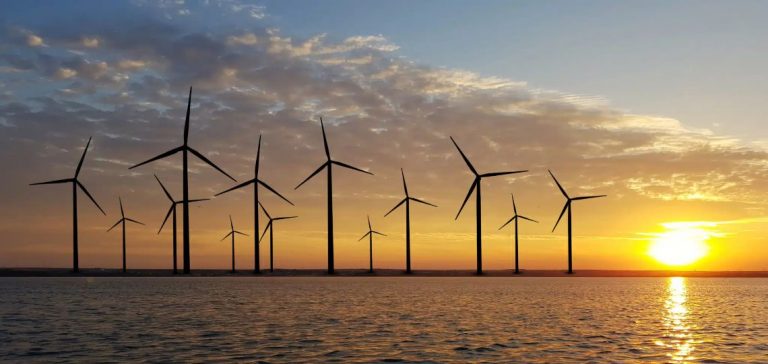The Marseille-Fos port has initiated a public consultation for the Deos project, aimed at establishing a platform for the construction and assembly of floating wind turbines in the Mediterranean. The consultation will run from October 14 to December 23, 2024, and seeks to gather feedback from local residents and stakeholders on the implications and integration of this new infrastructure within the industrial-port zone of Fos-sur-Mer (Bouches-du-Rhône). According to port officials, this platform is expected to produce up to 25 wind turbines annually starting in 2028, with the capacity to manufacture concrete or steel floaters, assemble turbines, and manage anchoring systems.
Project proponents estimate that Deos could generate up to 2,000 jobs during its operational phase, aiming to establish an industrial wind turbine sector in France. The project aligns with the national offshore wind development strategy, which targets a production capacity of 18 gigawatts (GW) by 2035, compared to the current 1.5 GW. The Marseille-Fos port aims to play a pivotal role in this expansion by providing infrastructure capable of supporting the deployment of floating wind farms.
Local Challenges and Environmental Impact
René Raimondi, the mayor of Fos-sur-Mer, expressed his concerns during the project presentation, emphasizing that the town is already heavily impacted by industrial and logistical activities. The industrial-port zone of Fos-sur-Mer is currently the second-largest emitter of greenhouse gases in France, a situation frequently criticized by local associations and public authorities. The mayor fears that the addition of this new infrastructure could further deteriorate living conditions and disrupt the ecological balance of the region.
Indeed, the project’s technical documentation highlights that the platform could become a source of atmospheric pollutants and increased noise and vibration levels, potentially affecting natural habitats and marine species. The project’s developers will need to address these local concerns and ensure that the Deos platform adheres to current environmental standards while minimizing disturbances for local communities.
Strategic Positioning for Offshore Wind Development in the Mediterranean
Two floating wind farms are already planned in the Mediterranean: one in Fos-sur-Mer and another in Port-la-Nouvelle, in the Aude region. Each of these farms is expected to produce 250 megawatts (MW) per year, contributing to the national objective of decarbonizing the energy mix. The Mediterranean has been chosen as an expansion zone for floating wind due to favorable maritime conditions, with steady winds and suitable depths for such installations. However, these projects often face local opposition due to their impact on the landscape, fishing, and traditional maritime activities.
For the Marseille-Fos port, successfully implementing the Deos platform is a strategic priority. This infrastructure could strengthen its position as an industrial hub for renewable energies and allow it to diversify its activities beyond its traditional logistics sector. However, local support will largely depend on the port’s ability to demonstrate that this development respects social and environmental balances.
The Role of Wind Energy in France’s Energy Transition
Wind power is currently the third-largest source of electricity production in France, behind nuclear and hydropower. The government has reinforced its commitments to the energy transition, targeting a 40% share of renewables in the electricity mix by 2030. To achieve this goal, offshore wind development is essential, especially in areas where onshore wind farms face geographical and land constraints. Infrastructure like the Deos platform will play a crucial role in supporting this growth.
However, challenges remain. Beyond environmental and neighborhood issues, the French wind industry must also contend with increasing international competition, particularly from Northern European countries that are already advanced in this sector. The success of the Deos project will depend on its ability to integrate into a competitive industrial ecosystem while meeting sustainability and social acceptability requirements.






















